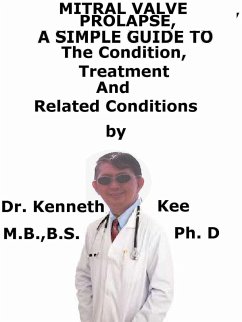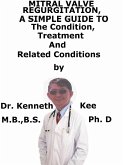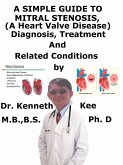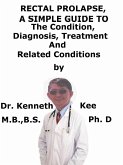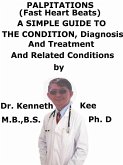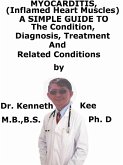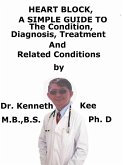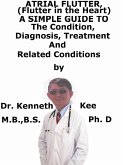The flaps of the valve are floppy and do not close tightly
Much of the time MVP does not cause any problems.
Rarely blood can leak the wrong way through the floppy valve.
This can lead to palpitations, shortness of breath, chest pain, and other symptoms.
Diseases that are at Risk for Mitral Valve Prolapse are:
Connective tissue disease like Marfan's Syndrome
Scoliosis and other skeletal problems
Some types of muscular dystrophy
Stretched valve flaps can make a clicking sound as they shut.
If the mitral valve is leaking blood back into the left atrium, the doctor may hear a heart murmur or whooshing sound.
However these abnormal heart sounds may come and go.
a. Echocardiography (echo) is the most useful test for diagnosing MVP.
Echo can show prolapse of the mitral valve flaps and backflow of blood through the leaky valve.
MVP is treated with medicines, surgery, or both.
The goals of treating MVP include:
a. Preventing infective endocarditis (IE), arrhythmias, and other complications
b. Relieving symptoms
c. Correcting the underlying mitral valve problem
Medicines called beta blockers may be used to treat palpitations and chest discomfort in people who have little or no mitral valve backflow.
Other medicines are:
a. Vasodilators to widen your blood vessels and reduce your heart's workload.
b. Digoxin to strengthen your heartbeat.
c. Diuretics (water pills) to remove excess fluid in your lungs.
d. Medicines such as flecainide and procainamide to regulate your heart rhythms.
e. Blood-thinning medicines to reduce the risk of blood clots forming if you have atrial fibrillation.
Surgery is done only if the mitral valve is very abnormal and blood is flowing back into the atrium.
The main goal of surgery is to improve symptoms and reduce the risk of heart failure.
Traditionally heart surgeons repair or replace a mitral valve by making an incision (cut) in the breastbone and exposing the heart.
A small but growing number of surgeons are using another approach that involves one or more small cuts through the side of the chest wall.
This results in less cutting, reduced blood loss, and a shorter hospital stay.
Valve Repair and Valve Replacement
In mitral valve surgery, the valve is repaired or replaced.
Valve repair is preferred when possible.
Repair is less likely than replacement to weaken the heart.
Repair also lowers the risk of infection and decreases the need for lifelong use of blood-thinning medicines.
If repair is not an option, the valve can be replaced.
Mechanical and biological valves are used as replacement valves.
TABLE OF CONTENT
Introduction
Chapter 1 Mitral Valve Prolapse
Chapter 2 Interesting Facts about Mitral Valve Prolapse
Chapter 3 Treatment of Mitral Valve Prolapse
Chapter 4 Mitral Stenosis
Chapter 7 Mitral Regurgitation
Chapter 8 Tricuspid Regurgitation
Chapter 9 Pulmonary Stenosis
Chapter 10 Tricuspid Stenosis
Epilogue
Mitral Valve prolapse is a rare hereditary disease
Where the mitral valves do not close tightly and are too floppy
Blood may leak from the ventricle back into the atrium
This may cause strain on the left atrial myocardium
The mitral valve makes a systolic murmur, a whooshing sound
When the valve leaks back into the left atrium a small amount
The stretched valve flaps can make a click sound as they shut.
The echocardiogram show the valve movement in the heart
Treatment is to reduce the heart's workload by medications
Beta blockers may be used to treat chest discomfort or palpitations
Blood-thinning medicines reduce the risk of blood clots forming
Surgery is needed if the abnormal mitral valve allows the blood back flowing
-An original p...
Dieser Download kann aus rechtlichen Gründen nur mit Rechnungsadresse in A, B, CY, CZ, D, DK, EW, E, FIN, F, GR, H, IRL, I, LT, L, LR, M, NL, PL, P, R, S, SLO, SK ausgeliefert werden.

